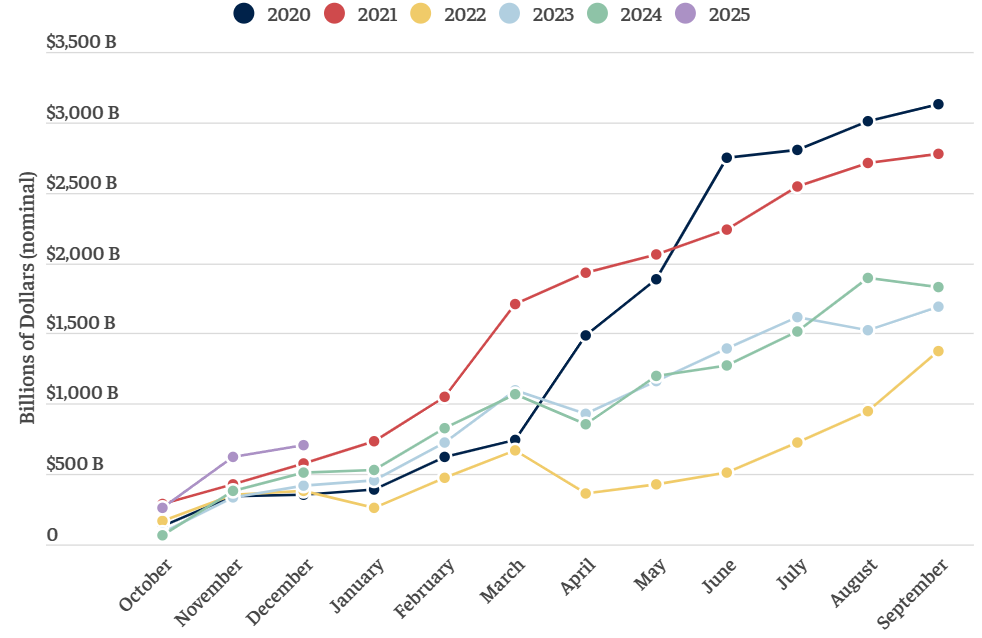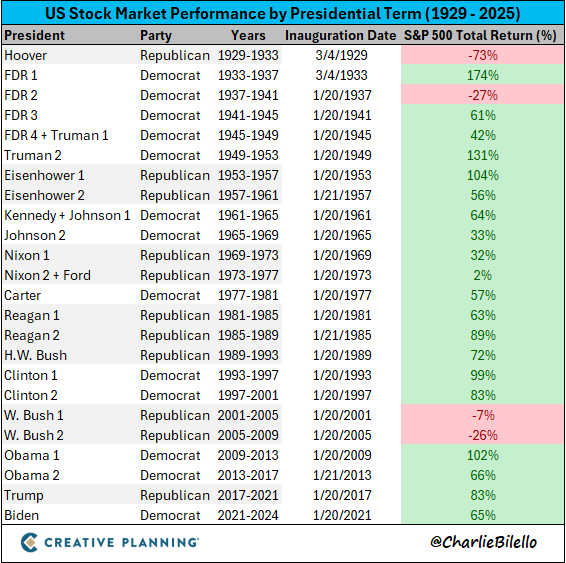On Monday, Donald Trump was officially sworn in as the 47th President of the United States. According to Stephen Miller, Trump’s deputy chief of staff for policy and homeland security advisor, inauguration day would be followed by several executive orders and it turned out to be the case.
These orders are primarily aimed at neutralizing the Biden admin’s policies on DEI, immigration, climate change, and securing the US-Mexico border fence. Interestingly, in a 180 reversal from his 1st term when he tried to ban TikTok, this should also cancel the imminent TikTok ban, which prompted the widely popular social media app to restore service to US users.
Such a move indicates that Trump’s 1st term should not be considered a clear-cut reference point. However, from Trump’s personnel picks, it is already clear what kind of macroeconomic landscape investors should expect.
Balancing the Budget is Going to be a Daunting Task for the Trump Administration
After the Biden admin broke all records in budget deficits and national debt, Trump’s admin has a daunting task ahead. The Congressional Budget Office (CBO) had already issued a statement on Friday that the new admin will face a $1.865 trillion budget deficit for fiscal 2025. This is assuming that Trump’s tax cuts from 2017 will expire, which makes it a baseline forecast.

In turn, the enormous gap between federal spending and federal revenue will be the driving force that determines Trump’s policies. His Treasury Secretary pick, Scott Bessent, seems to favor spending cuts over raising taxes to make up for the shortfall.
According to Bessent’s testimony before the Senate Finance Committee last Thursday, Trump’s 1st term tax cuts within the Tax Cuts and Jobs Act (TCJA) of 2017 should be extended. Bessent also emphasized that the US has a spending problem and not a revenue shortfall problem, suggesting imminent budget cuts across the board.
That spending could be carved from foreign aid, federal aid programs, green energy subsidies, public housing and rental subsidies, broadband subsidies, community development grants via HUD, and Medicaid, to name a few. Previously, Elon Musk aimed for $2 trillion worth of cuts as the ideal goal within his Department of Government Efficiency (DOGE), but recently halved that expectation.
Overall, Bessent’s plan is to institute a “3-3-3” economic plan, referring to cutting the federal budget deficit to 3% of GDP, raising real GDP (adjusted for inflation) to 3%, and boosting oil supply by an extra 3 million daily barrels by 2028.
Should We Expect the Inflation Rate to Drop Under Trump?
It is certain that the cost of living will keep increasing as an artifact of central banking. A reversal – deflation – would likely result from increased unemployment, lower production, and consumer spending, all of which would signal major political weakness that is to be avoided by the Fed’s monetary tools.
The latest (CPI) for December showed an annual inflation rate of 2.9%, or 3.2% core rate (excludes volatile food and energy). The Federal Reserve tends to use core rate to guide its monetary policies, having maintained that the target should be 2%.
Of course, this just means that this is the baseline erosion rate of the dollar’s purchasing power, which is why has been gaining ground.
New Treasury Secretary Bessent asserted that the Fed should remain independent, which signals a continuation of Fed Chair Jerome Powell’s policy-making until his mandate expires in May 2026.
At Thursday’s Senate hearing, Bessent couldn’t think of why the inflation rate would go higher during Trump’s 2nd term. Rather, he noted it should be “much closer” to the Fed’s 2% target.
End of Operation Choke Point
During the Biden admin, it became apparent that regulatory agencies used underhanded tactics to debank the blockchain space as it exists in decentralized form, attached to regulated commercial banks as fiat on-ramps. Securities and Exchange Commission (SEC) Chair Gary Gensler further compounded this vector of attack by creating regulatory uncertainty as any digital asset outside Bitcoin could be security.
Given that Trump, and his family, are involved in digital assets, in addition to supporting Bitcoin at 2024 Bitcoin Conference in Miami, a friendlier crypto landscape is emerging. This was confirmed last week when Republican SEC officials promised a crypto regulations overhaul.
Outside of fraud, this should translate to less oppressive enforcement and greater clarity on which crypto coins should be treated as securities. Whether this will finally result in a comprehensive digital asset legislation is another matter. Given that it would require bipartisan consensus in a light Republican House majority (218 R vs 215 D), it is still unlikely.
What About Immigration and Deregulation?
To make it more easier for businesses to operate, the Trump admin is expected to significantly reduce federal oversight, having hinted to cut ten regulations for every new one implemented. Elon Musk’s DOGE is certainly pointing towards that direction but it remains to be seen if it will be fruitful due to the paralyzing institutional pushback seen in Trump’s 1st term.
What is more certain is that the oil & gas industry will benefit from his “drill, baby, drill” policy. At a minimum, this should translate to canceling Biden admin’s approval suspension on liquified exports. The Biden admin also abruptly announced a ban on all new offshore oil and gas development in early January.
President Trump was quite clear about his stance on such policies on the Hugh Hewitt radio program:
“It’s ridiculous. I’ll unban it immediately. I will unban it. I have the right to unban it immediately,”
Regarding the centerpiece of the presidential campaign – immigration – this is less certain. Although “mass deportation now” signs were a regular occurance, “lock her up” signs were as well in previous run. Trump’s border czar Tom Homan seems to prioritize illegal migrants who committed crimes, while other categories should “self-deport”:
“While we’re out prioritizing the public safety threats and national security threats, if you wanna self-deport, you should self-deport because, again, we know who you are, and we’re gonna come and find you.”
Tom Homan on Fox News hosted by Sean Hannity
This approach may be problematic given the status of sanctuary cities under Democrat control, as was recently demonstrated by botched Chicago raid announcement. In the end, mass deportations are likely to amount to token deportations of illegals who would’ve been deported anyway, which would be far below 20-40 million.
In turn, the likelihood of increased inflationary pressure would be lessened, as labor shortages wouldn’t increase higher production costs that would be passed on to consumers.
A Return to Tariffs in Focus and the Trade War Under Trump
As previously covered, the Trump admin will largely focus on tariffs to cover the renewal of 2017 tax cuts and not introduce new tax burdens. This is not that controversial, considering that the US was built on tariffs. In fact, the federal income tax was introduced in February 1913, the same year the Federal Reserve was founded in December.
However, to avoid potential retaliatory measures from trading partners in a global economy, the Trump admin is set to increase them gradually by 2% – 5% on a monthly basis. This should give other countries time to adapt.
Despite the massive budget deficits, tariffs are poised to further entrench American economic and geopolitical hegemony as other economies are comparatively worse. In particular, China, Japan and the EU.
This is amply demonstrated by the recent fall of currencies against the dollar. At the same time, the US stock market completely overshadows the global equity market, constituting all-time high 65% weight. Lastly, when it comes to presidencies affecting stock performance, the S&P 500 returns tend to go up regardless. In the modern era, the only exceptions were two terms under George W. Bush.

***
Neither the author, Tim Fries, nor this website, The Tokenist, provide financial advice. Please consult our website policy prior to making financial decisions.

